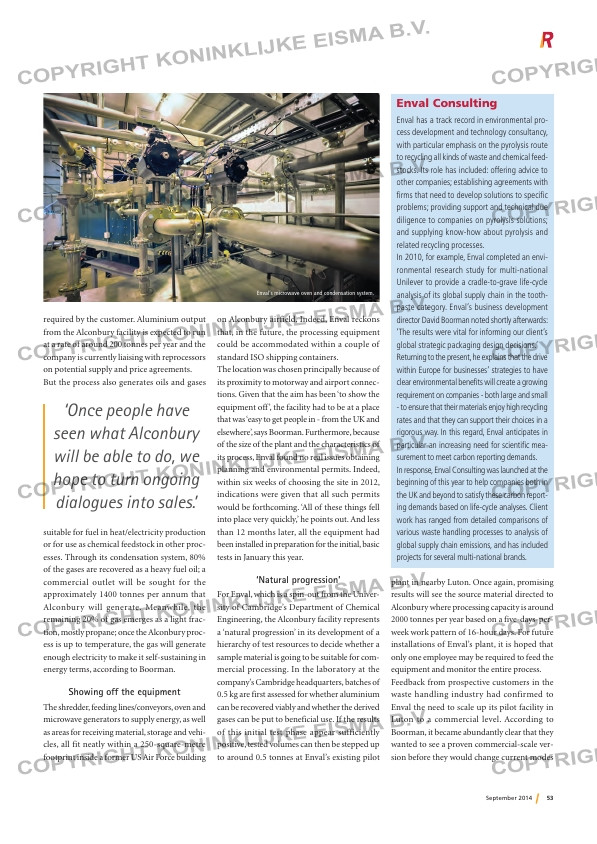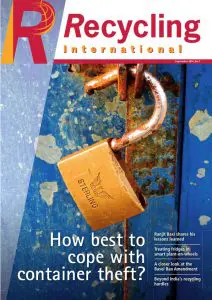Page 53 from: September 2014

53September 2014
required by the customer. Aluminium output
from the Alconbury facility is expected to run
at a rate of around 200 tonnes per year and the
company is currently liaising with reprocessors
on potential supply and price agreements.
But the process also generates oils and gases
suitable for fuel in heat/electricity production
or for use as chemical feedstock in other proc-
esses. Through its condensation system, 80%
of the gases are recovered as a heavy fuel oil; a
commercial outlet will be sought for the
approximately 1400 tonnes per annum that
Alconbury will generate. Meanwhile, the
remaining 20% of gas emerges as a light frac-
tion, mostly propane; once the Alconbury proc-
ess is up to temperature, the gas will generate
enough electricity to make it self-sustaining in
energy terms, according to Boorman.
Showing off the equipment
The shredder, feeding lines/conveyors, oven and
microwave generators to supply energy, as well
as areas for receiving material, storage and vehi-
cles, all fit neatly within a 250-square-metre
footprint inside a former US Air Force building
on Alconbury airfield. Indeed, Enval reckons
that, in the future, the processing equipment
could be accommodated within a couple of
standard ISO shipping containers.
The location was chosen principally because of
its proximity to motorway and airport connec-
tions. Given that the aim has been ‘to show the
equipment off ’, the facility had to be at a place
that was ‘easy to get people in – from the UK and
elsewhere’, says Boorman. Furthermore, because
of the size of the plant and the characteristics of
its process, Enval found no real issues obtaining
planning and environmental permits. Indeed,
within six weeks of choosing the site in 2012,
indications were given that all such permits
would be forthcoming. ‘All of these things fell
into place very quickly,’ he points out. And less
than 12 months later, all the equipment had
been installed in preparation for the initial, basic
tests in January this year.
‘Natural progression’
For Enval, which is a spin-out from the Univer-
sity of Cambridge’s Department of Chemical
Engineering, the Alconbury facility represents
a ‘natural progression’ in its development of a
hierarchy of test resources to decide whether a
sample material is going to be suitable for com-
mercial processing. In the laboratory at the
company’s Cambridge headquarters, batches of
0.5 kg are first assessed for whether aluminium
can be recovered viably and whether the derived
gases can be put to beneficial use. If the results
of this initial test phase appear sufficiently
positive, tested volumes can then be stepped up
to around 0.5 tonnes at Enval’s existing pilot
plant in nearby Luton. Once again, promising
results will see the source material directed to
Alconbury where processing capacity is around
2000 tonnes per year based on a five-days-per-
week work pattern of 16-hour days. For future
installations of Enval’s plant, it is hoped that
only one employee may be required to feed the
equipment and monitor the entire process.
Feedback from prospective customers in the
waste handling industry had confirmed to
Enval the need to scale up its pilot facility in
Luton to a commercial level. According to
Boorman, it became abundantly clear that they
wanted to see a proven commercial-scale ver-
sion before they would change current modes
Enval Consulting
Enval has a track record in environmental pro-
cess development and technology consultancy,
with particular emphasis on the pyrolysis route
to recycling all kinds of waste and chemical feed-
stocks. Its role has included: offering advice to
other companies; establishing agreements with
firms that need to develop solutions to specific
problems; providing support and technical due
diligence to companies on pyrolysis solutions;
and supplying know-how about pyrolysis and
related recycling processes.
In 2010, for example, Enval completed an envi-
ronmental research study for multi-national
Unilever to provide a cradle-to-grave life-cycle
analysis of its global supply chain in the tooth-
paste category. Enval’s business development
director David Boorman noted shortly afterwards:
‘The results were vital for informing our client’s
global strategic packaging design decisions.’
Returning to the present, he explains that the drive
within Europe for businesses’ strategies to have
clear environmental benefits will create a growing
requirement on companies – both large and small
– to ensure that their materials enjoy high recycling
rates and that they can support their choices in a
rigorous way. In this regard, Enval anticipates in
particular an increasing need for scientific mea-
surement to meet carbon reporting demands.
In response, Enval Consulting was launched at the
beginning of this year to help companies both in
the UK and beyond to satisfy these carbon report-
ing demands based on life-cycle analyses. Client
work has ranged from detailed comparisons of
various waste handling processes to analysis of
global supply chain emissions, and has included
projects for several multi-national brands.
Enval’s microwave oven and condensation system.
‘Once people have
seen what Alconbury
will be able to do, we
hope to turn ongoing
dialogues into sales.’
RI-7 Enval.indd 53 28-08-14 16:56



